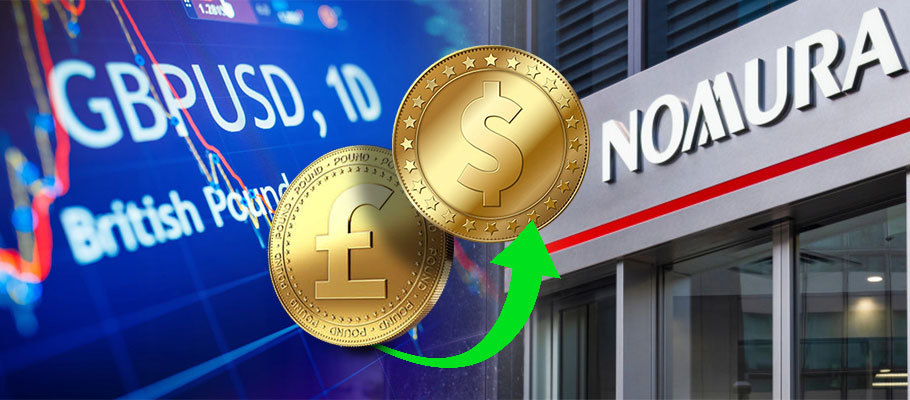
Published: September 3rd, 2021
A rising chorus of economists says the UK economy's growth has slowed in recent months. That’s putting a dent in the bullish stance many forex analysts have taken towards sterling across much of the year, especially against the euro.
Problems in the UK’s macro outlook have prompted Nomura Securities’ currency unit to call out factors like slowing credit card spending and rising COVID-19 cases as reasons to consider shorting the pound against the greenback.
The guidance comes in the wake of PMI numbers for August that revealed a steep drop in private sector activity amid rising business costs and shortages of skilled staff.
The pound climbed sharply in the first quarter of 2021 as the hard-hit UK economy came out of winter lockdowns.
But those gains began to stall in August, with GBP/EUR trending sideways below 1.17 but above 1.15. Against the greenback, the recent trend has been lower, with GBP/USD peaking at 1.41 in June before falling back towards the 1.37 support level.
Nomura says they're now 'short' on sterling against the dollar and anticipate a weaker pound in the near term.
Despite Nomura’s stance, there have been signs that British consumer sentiment is improving. That could provide support for the pound.
Consumer activity picked up in August as the infection rates from the COVID delta variant receded from June highs. The CBI Distributive Trades survey released this week showed a rebound in retail sales for August after declines in July.
In a note to investors, CIBC Capital Markets FX Strategy unit wrote that the recent survey data ‘points to a consumer-driven UK recovery narrative. Because of that, we remain biased towards EUR/GBP trading lower.’
Another survey of UK business activity released this week showed that 60 per cent of leisure and hospitality firms were forecasting a spike in revenues over Britain’s August bank holiday weekend, with 14 per cent saying they expected the busiest bank holiday for a decade.
Barclaycard’s SME Barometer showed confidence is returning to pre-pandemic levels among small and medium-sized businesses, with 40 per cent aiming to hire more staff over the next year.
The apparent signs of renewed confidence, paired with unremarkable Covid-19 infection rates, seems could combine to keep sterling afloat. Whether or not the confidence can sustain itself into Autumn will weigh heavily on the pound's outlook.
UK inflation is forecast to accelerate and approach the Bank of England's (BOE’s) projected 4.0 per cent threshold, which could prove decisive for consumer sentiment. Covid cases, meanwhile, are likely to spike again when schools re-open in England and Scotland.
For now, markets believe the Johnston government has set the bar high for any return to pandemic lockdowns. Of course, COVID has a habit of throwing a wrench into forward planning.
Nomura says the UK’s COVID-19 situation ‘is not as good as it could be’.
‘While vaccinations have made a significant impact, Westminster has relaxed restrictions even while case data is rising among highly-vaccinated groups. With Autumn approaching and schools set to re-open, we're also seeing seven times more hospitalisations versus a year ago.
‘We may yet see the imposition of new restrictions, vaccine passports and reduced mobility. Hopefully, this won't be the path ahead, but we have to acknowledge that it remains a risk in the near term.’
Of course, exchange rates can be a relative factor in currency valuations. Even if the UK economy is slowing, there are indications that the same factors touching Britain’s economy are also making their impact felt in other countries and regions.
A look at the notable economic slowdown in Asia-Pacific proves that the pandemic slowdown effect isn’t restricted to any one jurisdiction.
America’s economy is also seeing a sharp reduction in business activity, with last week's August PMI survey indicating that private sector revenue growth slowed sharply in the month, aggravated by capacity constraints linked to the spread of the delta variant.
For exchange rates, it’s how all these developments factor into central bank policy moves that matters most.
If the BOE stays on the path towards a 2022 interest rate rise, sterling may sustain support, especially against the euro, which is held back by a European Central Bank in no mood even to discuss a potential rate rise anytime soon.
Threadneedle Street will likely raise rates ahead of the ECB if the UK’s inflation levels hot up, which the bank thinks will pass the crucial 4.0 per cent level before 2021 is done.
The way inflation behaves next year will drive the pound's long-term outlook. Expectations for rate rises will intensify if inflation stays stubbornly high.
That will be reflected in higher yields for British government bonds. In the past, this has translated into support for sterling.
‘Our forecast is for UK CPI to double from the current level of two per cent towards four per cent,’ says Nomura. ‘An increase of that magnitude would be hard for BOE policymakers to ignore, which is another reason why short GBP exposure is risky in the near term. Growth may be cooling off, but inflation could spur hawkish signals from the central bank going into year-end.’
While Nomura is looking for short-run pound softness against the greenback, they still fancy it to hold onto support against the euro.
Trading on an outlook that expects the pound to rise against the euro still makes sense, Nomura says, since UK bond yields will probably remain above Eurozone yields thanks to central bank policy divergence.
‘There’s a complication, however, in that it’s a very slow-moving trade that has been range-bound for longer than we would have expected.
‘Taken together, it seems EUR/GBP’s medium- to long-term trajectory is clearly headed lower’, they added.